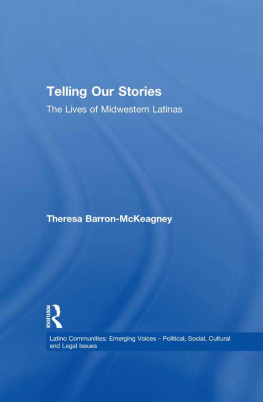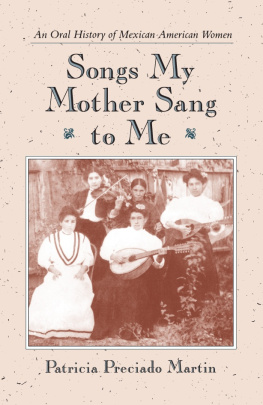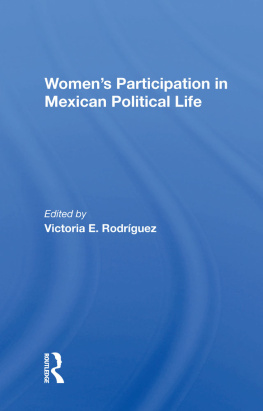LATINO COMMUNITIES
EMERGING VOICES
POLITICAL, SOCIAL, CULTURAL,
AND LEGAL ISSUES
Edited by
Antoinette Sedillo Lopez
University of New Mexico
A ROUTLEDGE SERIES
TELLING OUR STORIES
THE LIVES OF MIDWESTERN LATINAS
Theresa Barron-McKeagney
Published in 2002 by
Routledge
711 Third Avenue
New York, NY 10017
Printed in Great Britain by
Routledge
2 Park Square, Milton Park
Abingdon, Oxon OX14 4RN
Routledge is an imprint of the Taylor & Francis Group, an informa business
Copyright 2002 by Theresa Barron-McKeagney
All rights reserved. No part of this book may be reprinted or reproduced or utilized in any form or by any electronic, mechanical, or other means, now known or hereafter invented, including photocopying and recording, or in any information storage or retrieval system, without permission in writing from the publisher.
Cataloging-in-Publication Data for this book is available from the Library of Congress.
ISBN 0-415-93115-0
To my husband Don
and mi hijo Adam Vasquez
Contents
CHAPTER 1
INTRODUCTION
CHAPTER 2
LITERATURE REVIEW
CHAPTER 3
APPROACH
CHAPTER 4
LAS HISTORIAS
CHAPTER 5
SUMMARY OF FINDINGS AND THEMES
APPENDIX
TEXT BASE ALPHA CODES
T HERE ARE SEVERAL PEOPLE WHO I WOULD LIKE TO SHOW MY RESPECT TO IN THIS acknowledgment. I wish to thank my mentor and advisor, Robert Brown. Dr. Brown has shown me what it means to be a great professor, advisor and listener. He was always there to offer support and guidance through his humility. I will always be indebted to him. The School of Social Work at the University of Nebraska at Omaha specifically Dr. Sunny Andrews-Director, the Faculty and Staff, the former Dean of the College of Public Affairs and Community Service, David Hinton, whose constant support helped me to stay focused on my research regarding these important voices.
I am deeply honored and grateful to the women who agreed to be interviewed for this research, without their patience and understanding, this project could not have been completed. I wish to thank mi familia, my immigrant parents, Paul and Chonita whose fortitude and dream to build a better life for them and their children provided strong role modeling for me to follow. A special word of thanks to my mother who began my day when I was a little girl by drinking caf con leche with me and by asking, what my dreams were, the night before. Therefore, I began each day contemplating my dreams and what visions they predicted to come. What a blessing to learn this truth of dreams from my mother. My deepest respect and thanks to my nine sisters and brothers, who were all my mothers and fathers because I am the youngest (born to our parents long after they thought it was too late to have more children) whose support and bursting pride helped me to finish my writing. The various names that the reader finds in each chapter are the names of my mother, aunt, and sisters. This conscious effort to name my informants after my sisters and aunt brought me ever closer to my family as I wrote their names over and over again in this text. Memories of each sister, my mother and aunt fed me, and soon the informants' cuentos became my sisters' cuentos, and the two were strongly woven together.
I am grateful to mi cultura and todo mi gente who have shown me great love and support since I joined the Latino community twenty years ago. I continue to reach new heights because their support is my backbone and they are always there to remind me not to forget where I came from and to rely on the voices of my ancestors to help me listen to the stories of others.
Lastly, my deepest love and respect I give to my husband Don and mi hijo, my brown-eyed boy, Adam Vasquez. They are forever one in my heart. This work, I dedicate to them.
TELLING OUR STORIES
T HERE ARE APPROXIMATELY 32 MILLION LATINOS/HISPANICS IN THE UNITED STATES in the year 2001. Latino/Hispanic populations may include Central Americans, Latin Americans, Cubans, Puerto Ricans, Spanish Europeans, Mexican and Chicanos. Currently, Latino/Hispanic populations have tripled over the last decade to become perhaps the largest people of color group in the United States. Mexican-Americans account for nearly 65% of the Hispanic population in the United States. (Population Estimates Program, U.S. Census Bureau, 2000). Arias (1986) calls the rapid growth of the Hispanic population in the United States one of the most compelling social developments in the last 25 years (p. 27). Latinos now comprise about 12 percent of the total population of the United States. The Latino community in Nebraska is the largest and most rapidly expanding minority population in the state. Latinos number more than 72,000 (4.4 percent) of Nebraska's total population. This population has increased by 94.9 percent according to the 1998 Census data. (Health Status of Racial and Ethnic Minorities in Nebraska: Preliminary Findings October 2000).
Increasingly, there has been more research devoted to studying the Latino population (Bonilla-Santiago 1991; Gracia & De Greiff 2000; Ramirez 1998; Augenbraum & Stavans 1993; Garcia & Zea, 1997; Stanley 1998; Caetano 1986; Cuellar, Harris & Jasso, 1980; Humm-Delgado & Delgado, 1983; Mendoza & Martinez, 1981). These research studies have included topics related to alcohol and drug addiction, psychological interventions, educational issues, acculturation, and cross-cultural studies. There are still few studies, which exclusively focus on Latina women. Blea (1992) stated that until recently female roles in Hispanic and mainstream society have been severely limited (p. 99). Blea (1997) also describes that academic Chicana feminists have tended to define feminism for both Chicanas and Latinas (p. 39). This interesting point may lead many Chicana feminists to take into account class issues as they enter higher academe.
In an analysis of stereotypes of Mexican American women, Andrade (1982) notes that the omission of Latinas (as subjects and researchers) in research has contributed to the invisibility of Latinas. Much research has been devoted to the study of Latinos in general, but little qualitative research in the Midwest specifically has focused on Latinas on any issue. Therefore, according to Andrade (1982) there is a tendency to address programs of research on Mexican American women based on inadequate premises and little attention is given to the interaction between their sex, ethnicity, race, and social class.
Many acculturated Mexican Americans have become largely European American in their way of living, but many have retained knowledge of their traditional culture and speak Spanish. They maintain identification with their own heritage while participating in European American culture. According to Locke (1992), Mexican American culture represents the most constructive and effective means its members have of coping with their changed natural and social environment. An important element to keep in mind is the geographical location of Latinos. Is it easier to maintain an ethnic/ racial identity when Latinos' numbers are impressive? In the case of these women in Nebraska, difficulties were encountered due to low percentages of Latinos in this area.
Blea (1992) explains how Chicanas (Mexican-American women) balance two strong cultures. While doing so, they have broken old barriers to reach nontraditional goals and have, in turn, encountered new barriers and new goals. If studied carefully, the Chicana experience has the potential to guide Anglo, male dominated society in values and redefinition (p. 89). Cultural blending or being bicultural manifests itself among Chicanas in some highly specific ways (Blea, 1992). As Chicanas gain access to information, they gain social power. And as they gain social power, the old cultural structures change. As Chicanas gain information, they are able to change their lives (p. 93).






